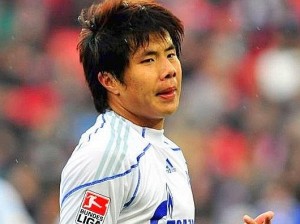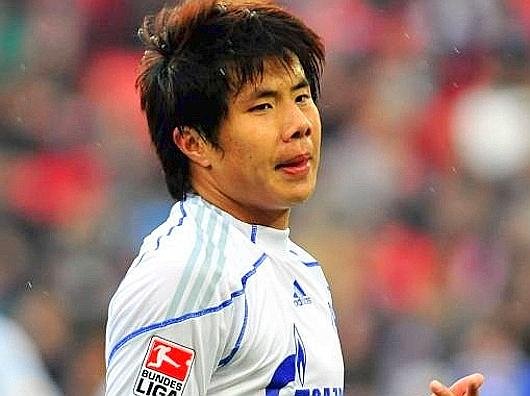 If you look up the Chinese National Team on Wikipedia, your eyebrows may raise when you look at the ‘Current squad’ section. Chinese players are virtually extinct in Europe!* Previously Hao Junmin was a national team regular, but this month he left the Bundesliga’s Schalke 04 to join the Chinese Super League’s Shandong Luneng.
If you look up the Chinese National Team on Wikipedia, your eyebrows may raise when you look at the ‘Current squad’ section. Chinese players are virtually extinct in Europe!* Previously Hao Junmin was a national team regular, but this month he left the Bundesliga’s Schalke 04 to join the Chinese Super League’s Shandong Luneng.
According to Chinese media, Hao was approached by England’s Arsenal, Liverpool, and Wigan, France’s Lyon, Russia’s Terek Grozny, China’s Hangzhou Greentown and his former club Tianjin Teda. He ultimately chose Shandong Luneng because he wants consistent playing time. He signed a three-year deal, and Shandong paid 110 000 Euros for his service.
This transfer raised much outcry from the Chinese fans because Hao is considered one of China’s leading players. Hao’s passing skill is top-notch, and his free-kick prowess is his trademark.
(Asian Cup 2011: China vs. Uzbekistan. Hao’s stunning free-kick, starting at 2:22)
http://www.youtube.com/watch?v=gJnPYm44X38&t=55s
(Friendly match: China vs. Tajikistan. Another trademark free-kick from Hao, starting at 0:55)
Hao was a household name at Tianjin TEDA. His skills were noticed by European scouts, and he was invited for a trial in Chelsea FC. However, nothing much happened after the trial (some reports said Chelsea made Hao Junmin an offer, but Tianjin TEDA rejected). Hao’s ability did not remain unnoticed. On May 29, 2009, China hosted a friendly against Germany, and within 5 minutes Hao scored. The game ended in a 1-1 draw, and Hao’s performance caught the attention of Felix Magath, the Schalke coach of that time.
(Friendly match: China vs. Germany. Hao Junmin scored rightaway)
During the first season, Hao broke into the first-team and played several games. However, things did not go too well when Hao was asked to play as a defender instead of his natural attacking role. Later Magath was sacked, the new coach Ralf Rangnick gave Hao one game to prove himself. Hao, again, was asked to play as a defender. His performance was criticized by the German media, and he was consistently linked with a move away from the club. Although Hao became the first Chinese to win the German Cup, his time was soon up.
Chinese players who made a name for themselves overseas are few and far between. Zhou Haibin at PSV, Li Weifeng at Everton, Du Wei at Celtic, Ma Mingyu at Perugia, and now Hao Junmin at Schalke, all of endured bad experiences. When will we see players of Sun Jihai or Fan Zhiyi’s caliber raise the profile of Chinese football by playing successfully overseas again?
* Disclaimer: I did not include Zhang Chengdong of Beira-Mar, Shao Jiayi of MSV Duisburg, Zhang Jiaqi of Le Mans, and etc. because they have not represented the national team recently. I have referenced the China vs. Laos roster for this article.

“He ultimately chose Shandong Luneng because he wants consistent playing time.”
Hao’s goal last night was a cracker – excellent first time shot. If he struggled to get regular game time with Schalke, then surely coming back to the CSL is a good move for him?
Better to be improving his skills here against a “lesser opposition” than sitting on the bench or playing for the reserves over in Europe.
It seems with all the discussion about Chinese football in previous posts that this dearth of stars and talent is part of the cycle of development that China will have to grit its teeth and see through before the benefits of any grass roots development programmes come through in the next decade or so.
Hey Yiddo, thanks for the comment, I have reply one of your points in my reply to good old CP.
Now when you mention about the grass roots development, the Chinese Football Association recently has been pushing kids to train in France’s FC Metz (http://wildeastfootball.org/2011/06/apprentices-de-le-fc-metz-au-revoir-et-bonjour/).
With Yi Teng and Liu Binbin (another apprentice in FC Metz) already left for China, I couldn’t tell if the program is successful or not.
There used to be a Hungarian club that employed one of two Chinese players, one of the players is named Men Yang (who is almost as tall as Jan Koller), but he went back to China.
Another recent grassroot development from CFA is Shanghai Shenhua sending three players (Gu Bin, Wang Yang, and Ma Xiaolei) to Lithuania’s Suduva. If you have been following the Chinese news of BigSoccer, Gu Bin and Wang Yang have just played in Suduva’s Europa campaign.
It would take a long time to tell if the grass roots development programme of sending young players oversea would work. Let’s hope China won’t face embarrassment in the Toulon Tournament again ; )
Thanks for putting up something on Hao Junmin though unfortunately he couldn’t continue at Schalke. It has to be noted too that his then-Japanese teammate, 23-year-old defender Uchida was a regular starter. There has to be some strong reasons why so many Chinese are failing in Europe. I hope that could be a new post or pub talk topic in the future. Yu Dabao should also be on the list of those who couldn’t make it in Europe because he spent several years in Portugal where he played sparingly for small sides (was with Benfica but was loaned out). But yes, I agree with Yiddo, if he couldn’t get regular playing time in Europe, it’s better to come back to China.
Uchida is a defender and Hao is an attacker, there shouldn’t be conflict. I don’t understand why Ralf and Magath would force Hao to play as a defender.
In reply to Yiddo and CP’s argument about “if Hao could not get regular time in Europe, he should go back to China”.
Of course Hao would receive substantial amount of first team ability to prove himself, but how many players who came back oversea have went back to Europe?
Li Tie, Zhou Haibin, Yu Dabao, Li Weifeng..they all stayed in Chinese Super League and didn’t go back. Not to mention about the Chinese way of business, if you signed a contract with them, technically you are going to stay with them almost for life (e.g. if an European club try to sign you, the deal will most likely be repelled unless they offer the Chinese club inflated price).
On contradictory to the above players, the only example that went back to Europe (from my absent-mind) is Dong Fangzhuo. Dong played for Dalian for two years, and he flopped. Then he went for Poland, Portugal, and now Armenia. He won an Armenian Cup, and said he wants to go back to European top leagues by playing for low-tier teams.
More info here about Dong: http://wildeastfootball.org/2011/04/dong-fangzhuo-the-travelling-disappointment-that-never-gave-up/
Chinese playing in oversea has been a touchy issue, other than Shao Jiayi and, lately, Zhang Chengdong, I can’t see any successful oversea players.
Thanks for the reply, smari.
I mentioned Uchida simply to contrast his experience (a starter at 23) with Hao, who barely played. I think this is a good example of the gulf between Japanese and Chinese players in Europe and it’s not good for Chinese football.
Regarding Hao’s return, I get your points- that if Chinese players only keep returning instead of doing anything in Europe, that won’t make China progress, and also, they probably won’t get another chance to go back to Europe.
About Shao Jiayi, why isn’t he playing more for China?
Shao Jiayi mentioned many times, through his Weibo (Chinese version of Twitter) and media, that he wants to go back to the national team.
However, Gao Hongbo never let him go back. The only time Shao Jiayi played under Gao’s regime is the unofficial friendly against Portugal.
I think Shao never fit into Gao’s team because of the youth policy; Gao rather give the spot to young talents such as Deng Zhuoxiang, Chen Tao, Yu Hai, and Feng Renliang. Another thing I realize is Gao don’t like prima donna, Li Weifeng is a famous prima donna (during his pre-Korean time).
Older players tend to have those ‘leadership’ or ‘霸道’ attitude, in this case, Shao Jiayi might not be included.
If you ask why Zheng Zhi is included, it was rumoured from the media that Zheng Zhi is actually a soft-spoken person. Some media even criticized the ‘softness’ of Zheng Zhi and that made him a bad captain during his time.
I like what I’ve seen so far of this “young China NT” under Gao. However in the other post about the performance against Jordan the comments by Luis Aragones that Hao Junmin was clearly the best player, while to be expected (if he is the only player in Europe), suggests that a better team could be fielded with some balance of old heads.
Perhaps the issue is not so much getting balance of experience but the danger of their attitude – is this something that a new coach can change or will the NT remain a work in progress for the next few years as the young ones develop and mature?
you mean against Laos not Jordan right? 😉
The balance of old and new players might be the classic (and safest) way for most national team approach. Regarding should Shao Jiayi come back, I really don’t have a specific yay or nay about it. Shao could give us good free kick, but we have Hao Junmin, Deng Zhuoxiang, and Chen Tao who could take the job.
Zheng Zhi played 45 mins against Laos, slipped a ball, and was immediately subbed during half time to make way for the more ‘explosive’ and ‘speedy’ Chen Tao. (Zheng Zhi could have played AMF too, but he wouldn’t be able to provide the dynamics of Chen Tao).
Back to our ‘balance of old-new approach’, let’s take a look of what Shao could offer for the current team.
If we need leadership, Shao Jiayi might be a difficult one to call because I don’t recall him being active in the national team for the past few years, and I havn’t seen him taking some sort of leadership role before.
If we need positioning and technique, Shao might be able to offer something to the Gao’s 4-5-1 formation, but the playmaker role doesn’t seem to be catered for Shao at all, if Zheng Zhi, Deng Zhuoxiang, and Chen Tao could play.
—
I forgot to mention this on my article:
According to Fu Bo (or someone in the coach team, I forgot) Shao Jiayi and Li Weifeng were actually considered for the China vs. Laos roster; however, they didn’t make it to the final list for unknown reason.